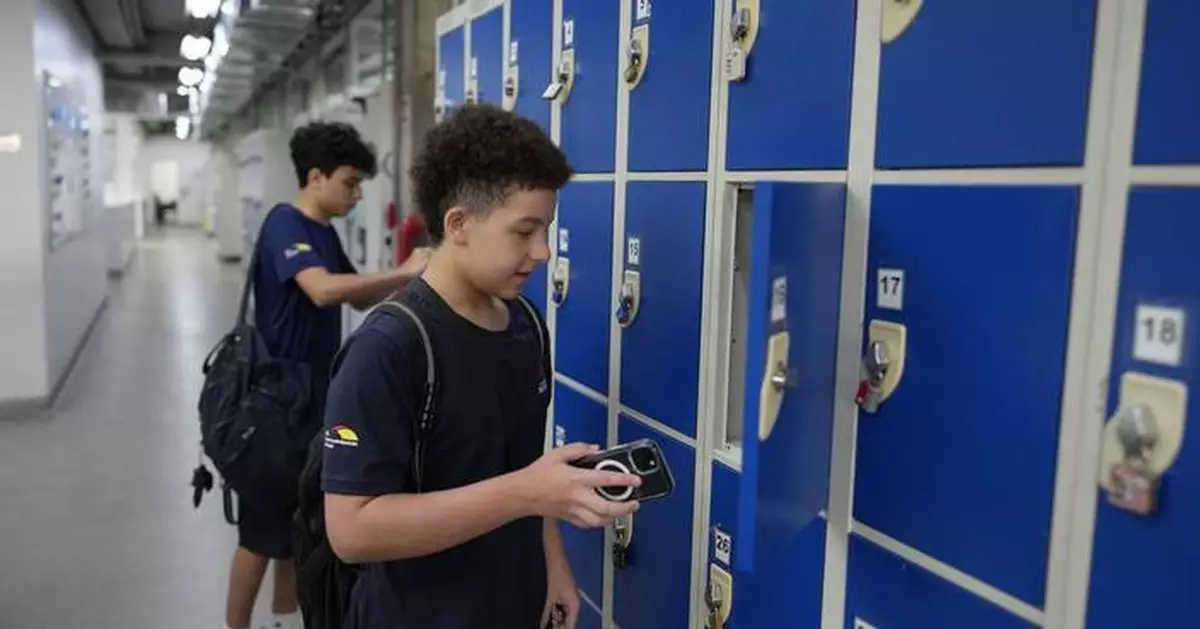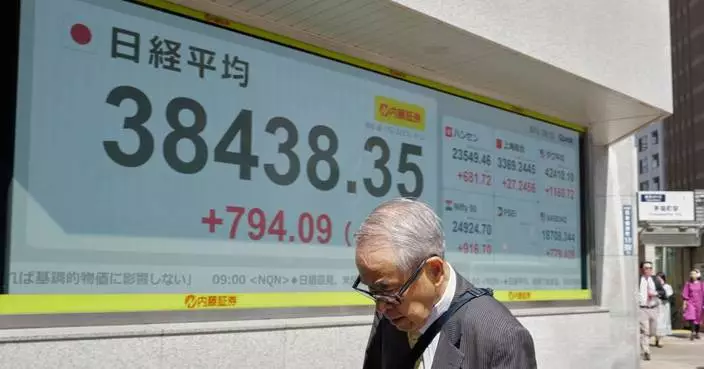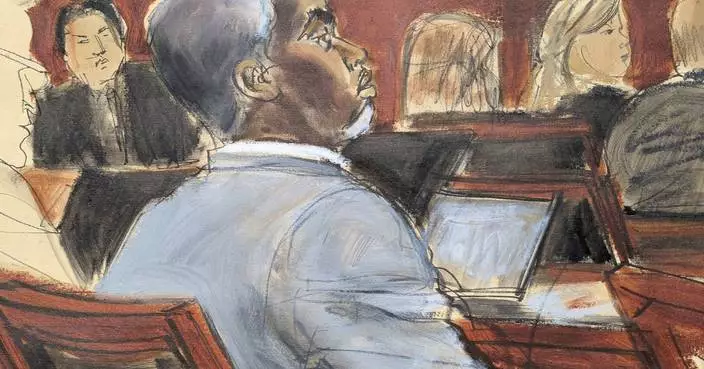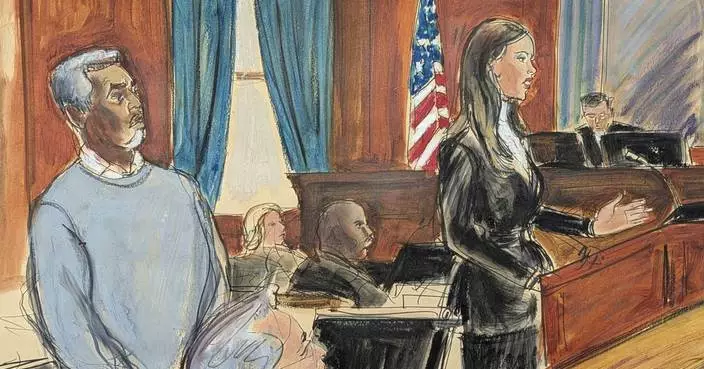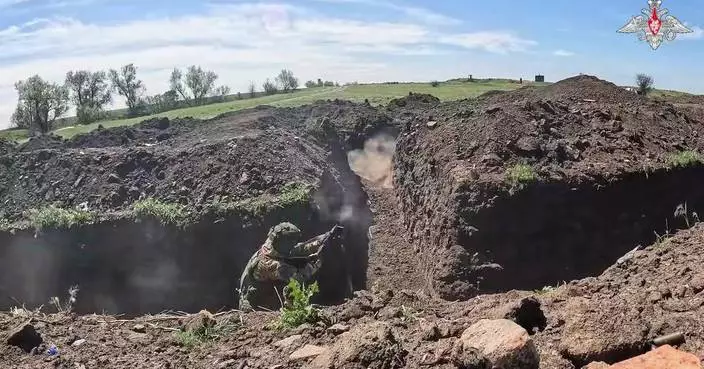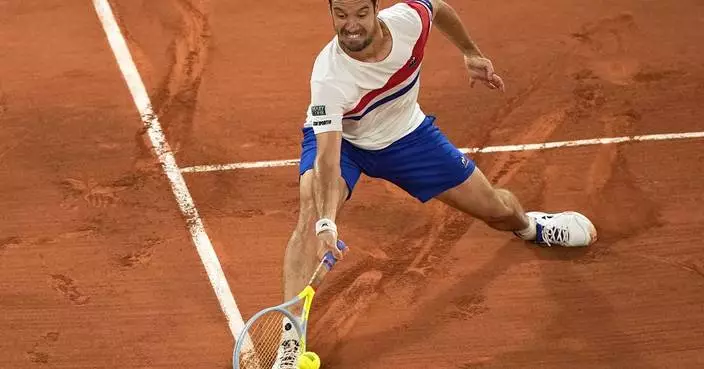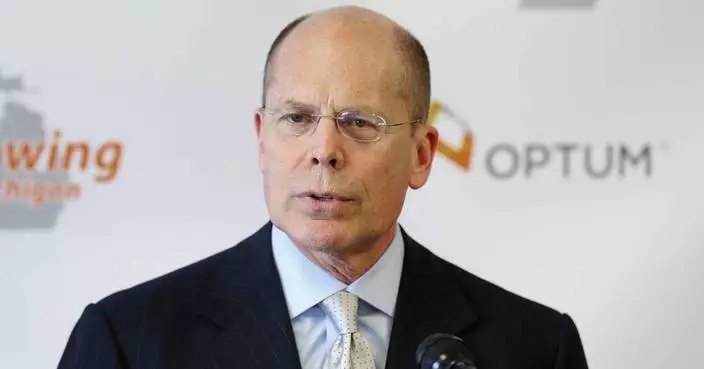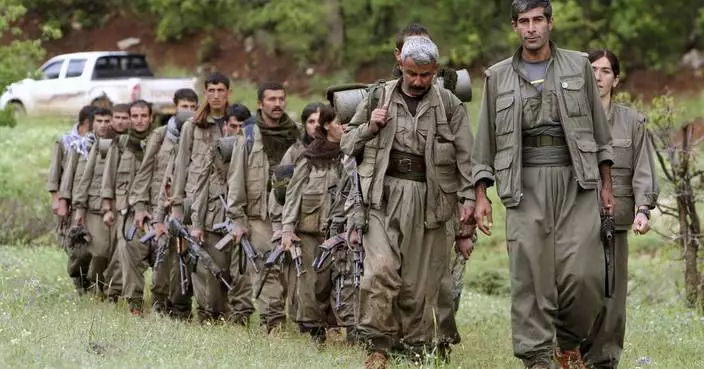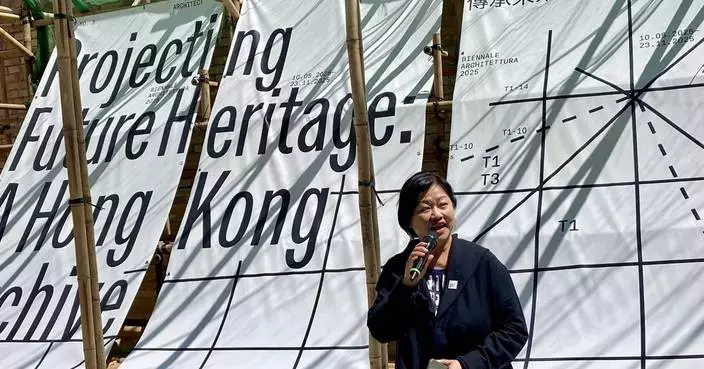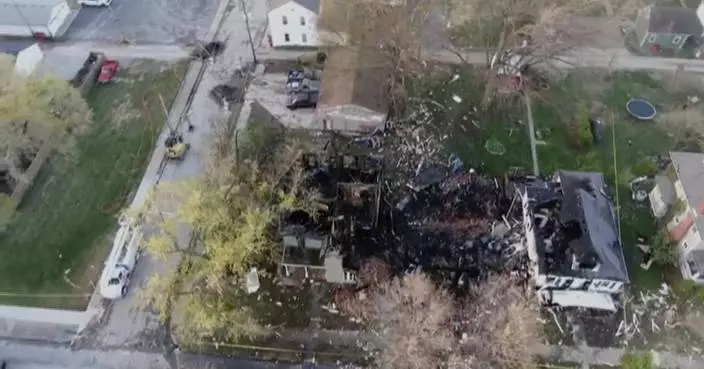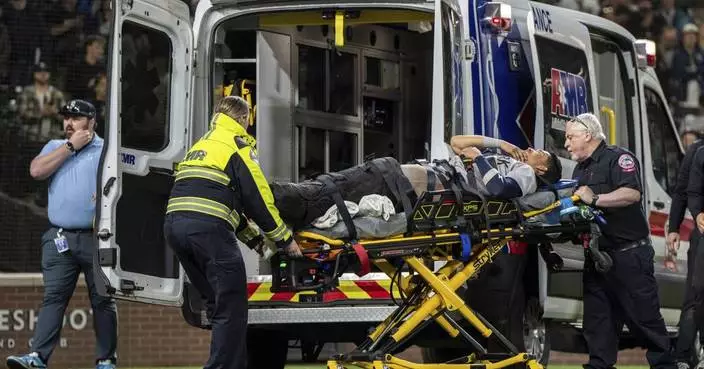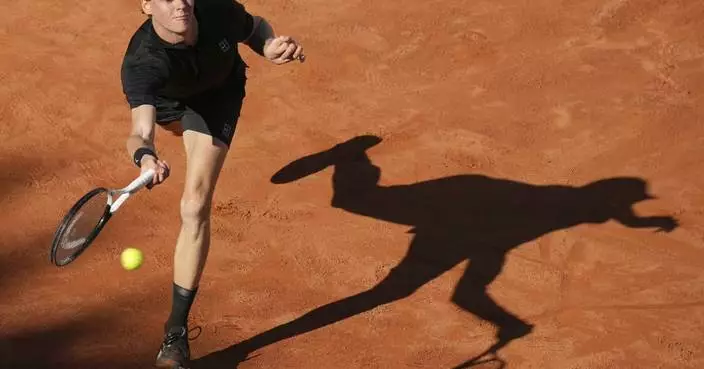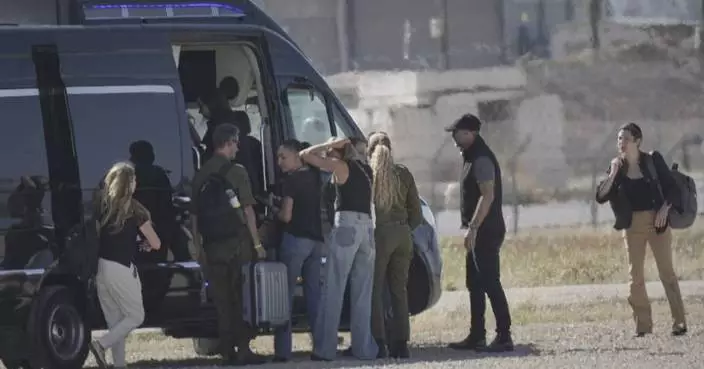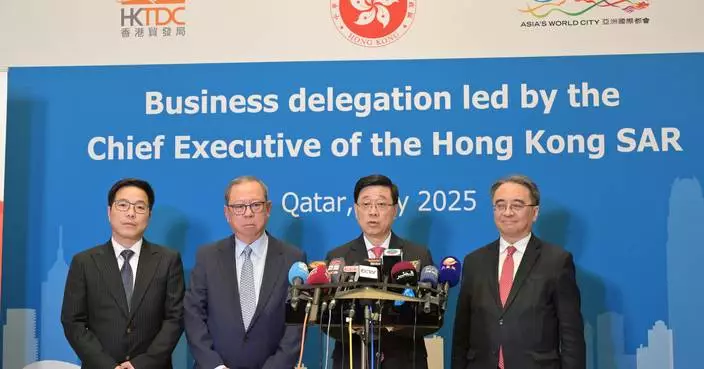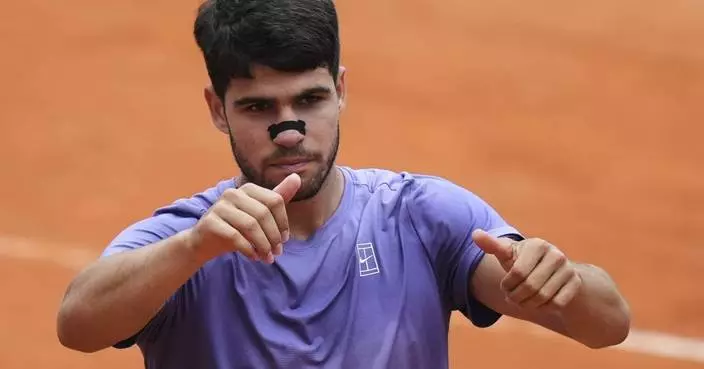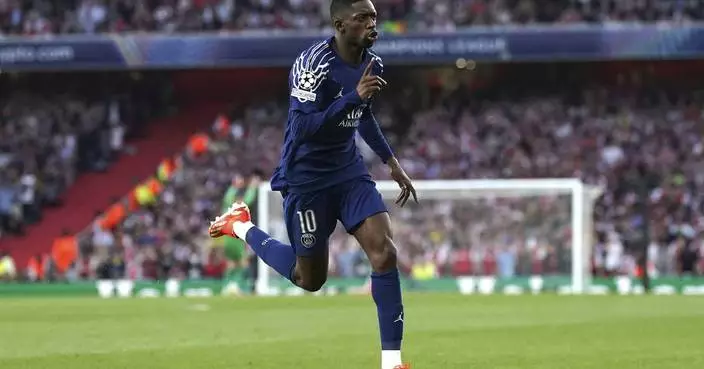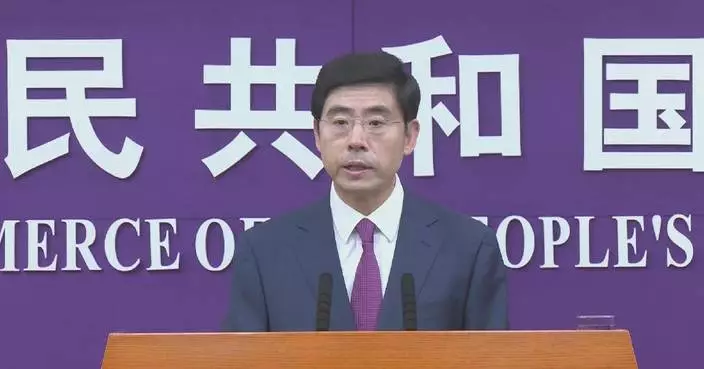SAO PAULO (AP) — Brazilian students returned to class this week with a new task: staying away from their smartphones as a new law restricting their use in schools took effect.
President Luiz Inácio Lula da Silva signed a bill in January limiting smartphone access at schools, in line with a trend seen in the U.S. and Europe. It applies to public and private schools, and applies to classrooms and the halls.
Click to Gallery
Students return to class after recess during their first week in school under a new law restricting the use mobile phones in school classrooms at Porto Seguro School in Sao Paulo, Thursday, Feb. 6, 2025. (AP Photo/Andre Penner)
A sign reads in Portuguese " The use of cell phones in the school is prohibited" at Porto Seguro school in Sao Paulo, Thursday, Feb. 6, 2025. (AP Photo/Andre Penner)
A student stores her mobile phone in a locker at Porto Seguro School in Sao Paulo, Thursday, Feb. 6, 2025, before heading to class under a new law restricting their use in schools. (AP Photo/Andre Penner)
Students attend a class at Porto Seguro School on their first week at school under a new law that forbids the use of mobile phones on campus, in Sao Paulo, Thursday, Feb. 6, 2025. (AP Photo/Andre Penner)
Students store their mobile phones in lockers at Porto Seguro School in Sao Paulo, Thursday, Feb. 6, 2025, as they head to class under a new law that forbids their use in schools. (AP Photo/Andre Penner)
Students play cards during recess in their first week at school under a new law that forbids the use of mobile phones on campus, at Porto Seguro School in Sao Paulo, Thursday, Feb. 6, 2025. (AP Photo/Andre Penner)
Students store their mobile phones in lockers as they head to class under a new law restricting their use on campus at Porto Seguro School in Sao Paulo, Thursday, Feb. 6, 2025.. (AP Photo/Andre Penner)
Phones are still allowed for educational purposes, with the teacher’s permission, and when needed for the student's accessibility and health. Schools can set their own guidelines, such as whether students can keep phones in backpacks or store them in lockers or designated baskets.
Before the federal law, most of Brazil's 26 states — including Rio de Janeiro, Maranhao and Goias — had already applied some restrictions to phone use in schools. As of 2023, nearly two-thirds of Brazilian schools had some limitations, with 28% banning them entirely, according to a survey last year by the Brazilian Internet Steering Committee.
But rules varied between states and between schools, and authorities and administrators struggled with enforcement.
That may have contributed to support for federal legislation from across the political spectrum — both allies of leftist Lula and the far-right former President Jair Bolsonaro. A survey released in October by Brazilian pollster Datafolha said that almost two-thirds of respondents wanted to ban smartphone use by children and teenagers at schools. More than three-quarters said those devices do more harm than good to their children.
Porto Seguro, a nearly 150-year-old private school in Sao Paulo, prohibited smartphones in classrooms last year and encouraged students to disconnect completely once a week. This year, it expanded its ban to include hallways, requiring students to keep their phones in lockers for the entire school day, including breaks.
“Students were having trouble concentrating," school principal Meire Nocito said in an interview Thursday. “There was also the issue of social isolation. Many students who used technology excessively would isolate themselves during breaks, interacting only through social media.”
“Banning cellphone use has helped create a space for social interaction, fostering relationships and teaching students to navigate conflicts, which are a natural part of human interactions. It has been very positive,” she added.
Brazil’s Ministry of Education said in a statement Monday that the restriction aims to protect students’ mental and physical health while promoting more rational use of technology.
In May, Fundacao Getulio Vargas, a leading think-tank and university, said Brazil had more smartphones than people, with 258 million devices for a population of 203 million Brazilians. Local market researchers said last year that Brazilians spend 9 hours and 13 minutes per day on screens, which is among one of the world’s highest rates of use.
Institutions, governments, parents and others have for years associated smartphone use by children with bullying, suicidal ideation, anxiety and loss of concentration necessary for learning. China moved last year to limit children’s use of smartphones, while France has in place a ban on smartphones in schools for kids aged six to 15.
Cell phone bans have gained traction across the United States, where eight states have passed laws or policies that ban or restrict cellphone use to try to curb student phone access and minimize distractions in classrooms.
An increasing number of parents across Europe who are concerned by evidence that smartphone use among young kids jeopardizes their safety and mental health.
A report published in September by the U.N.'s Educational, Scientific and Cultural Organization, or UNESCO, said one in four countries has already restricted the use of such devices at schools.
Meta chief executive Mark Zuckerberg apologized used a U.S. Senate hearing last year to apologize to parents of children exploited, bullied or driven to self harm via social media. He also noted Meta’s continued investments in “industrywide” efforts to protect children.
Mariana Waetge, a 13-year-old student at Porto Seguro, has owned a smartphone for five years. She uses it to communicate with friends and family and to find entertainment on social media, especially Instagram. Being forced to stay away from her phone made her find new ways to interact with friends, improved her focus and even strengthened her relationship with her family.
The restriction also helped "include people who didn’t have many friends and would use their phones to hide from making new friends or to avoid being out there,” she said in an interview. “Now they don’t have that option anymore. These people end up playing board games or reading books.”
AP videojournalist Thiago Mostazo contributed to this report.
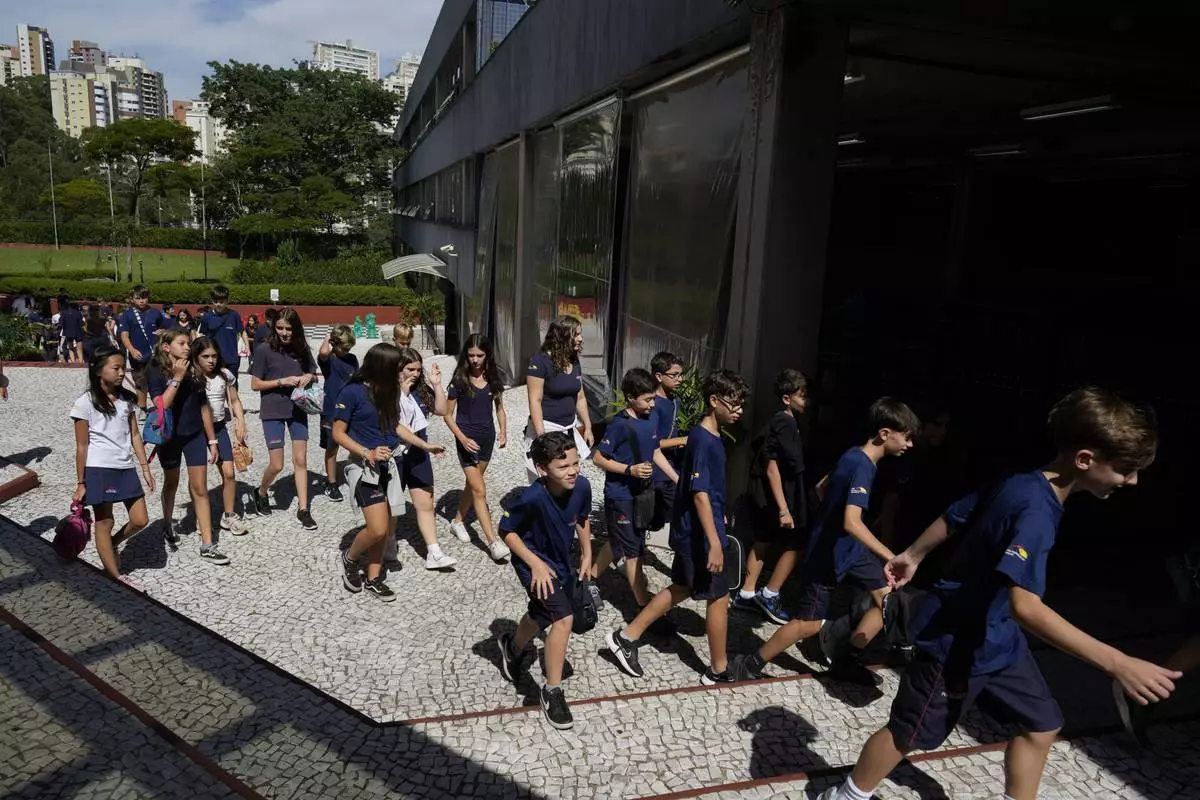
Students return to class after recess during their first week in school under a new law restricting the use mobile phones in school classrooms at Porto Seguro School in Sao Paulo, Thursday, Feb. 6, 2025. (AP Photo/Andre Penner)
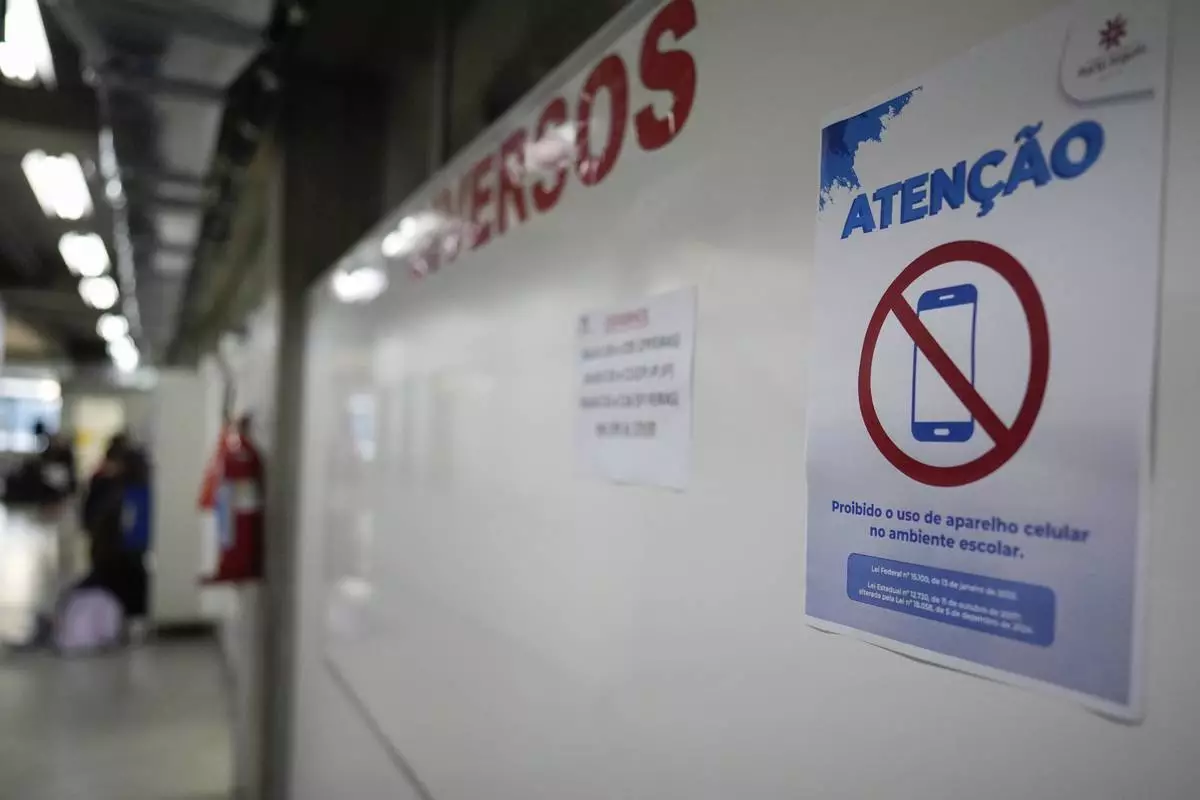
A sign reads in Portuguese " The use of cell phones in the school is prohibited" at Porto Seguro school in Sao Paulo, Thursday, Feb. 6, 2025. (AP Photo/Andre Penner)
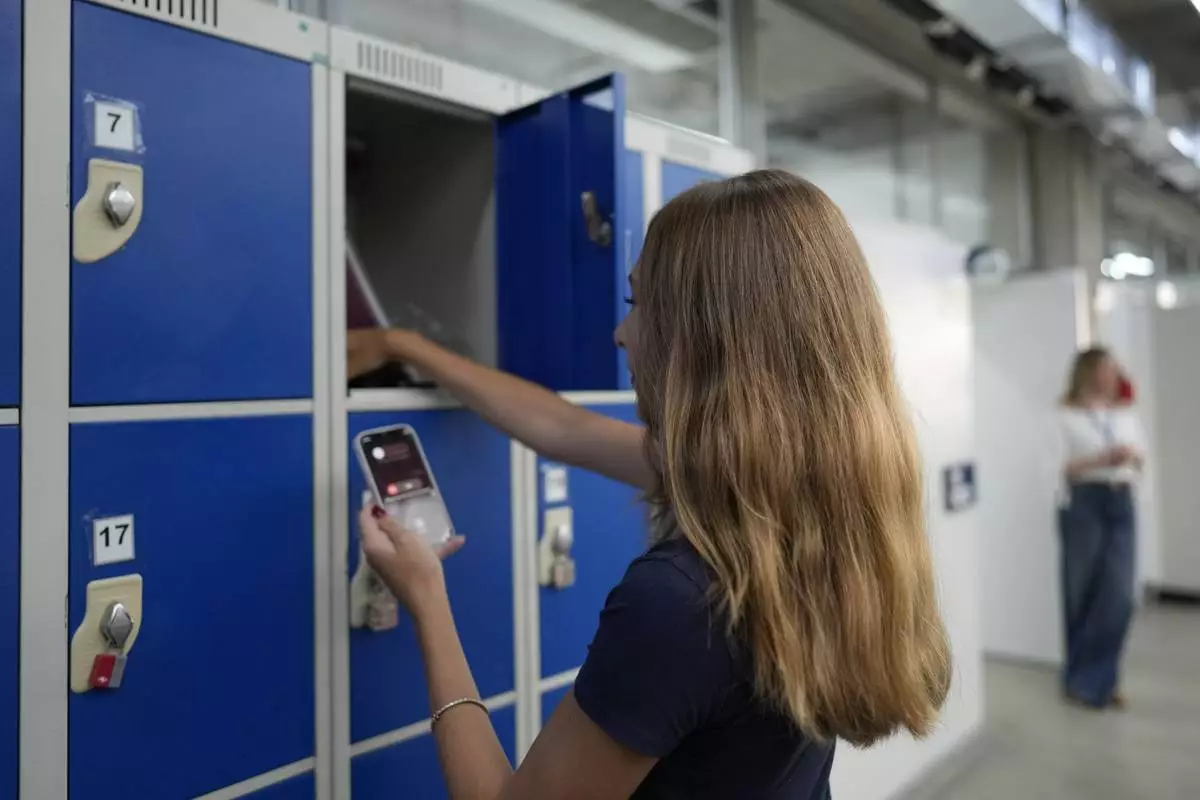
A student stores her mobile phone in a locker at Porto Seguro School in Sao Paulo, Thursday, Feb. 6, 2025, before heading to class under a new law restricting their use in schools. (AP Photo/Andre Penner)
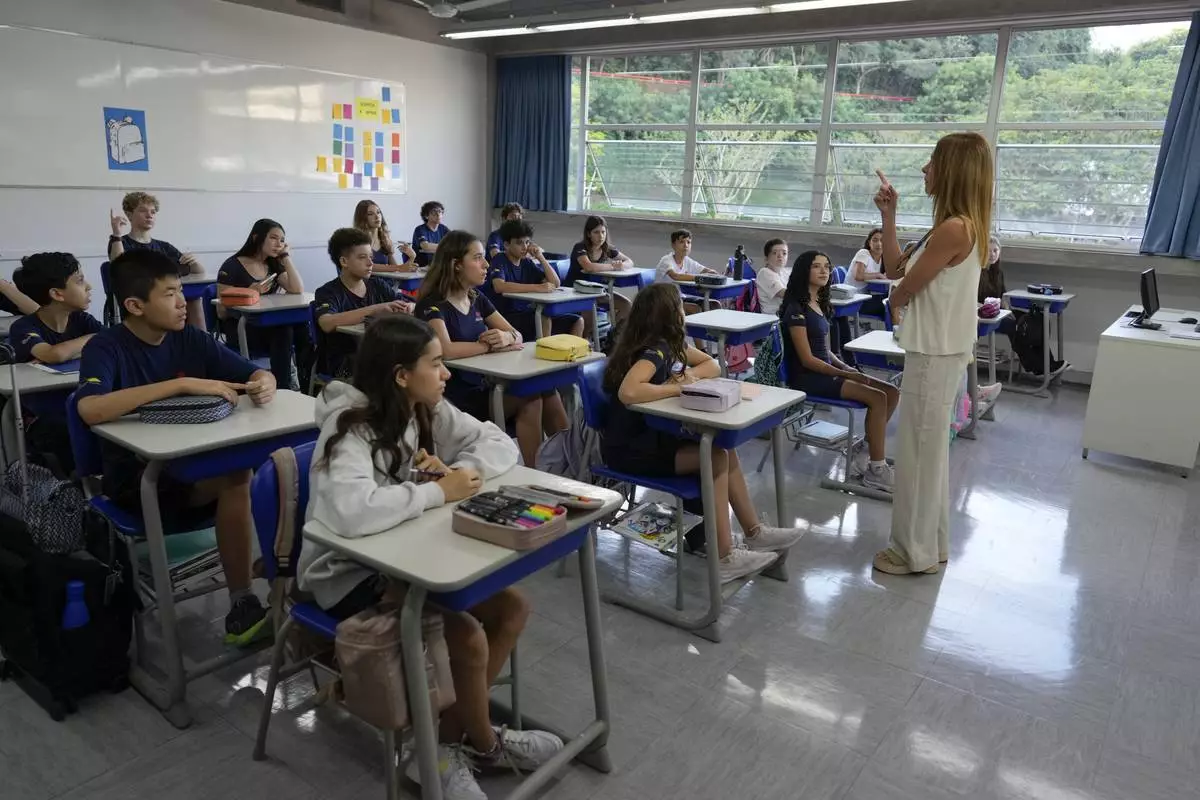
Students attend a class at Porto Seguro School on their first week at school under a new law that forbids the use of mobile phones on campus, in Sao Paulo, Thursday, Feb. 6, 2025. (AP Photo/Andre Penner)
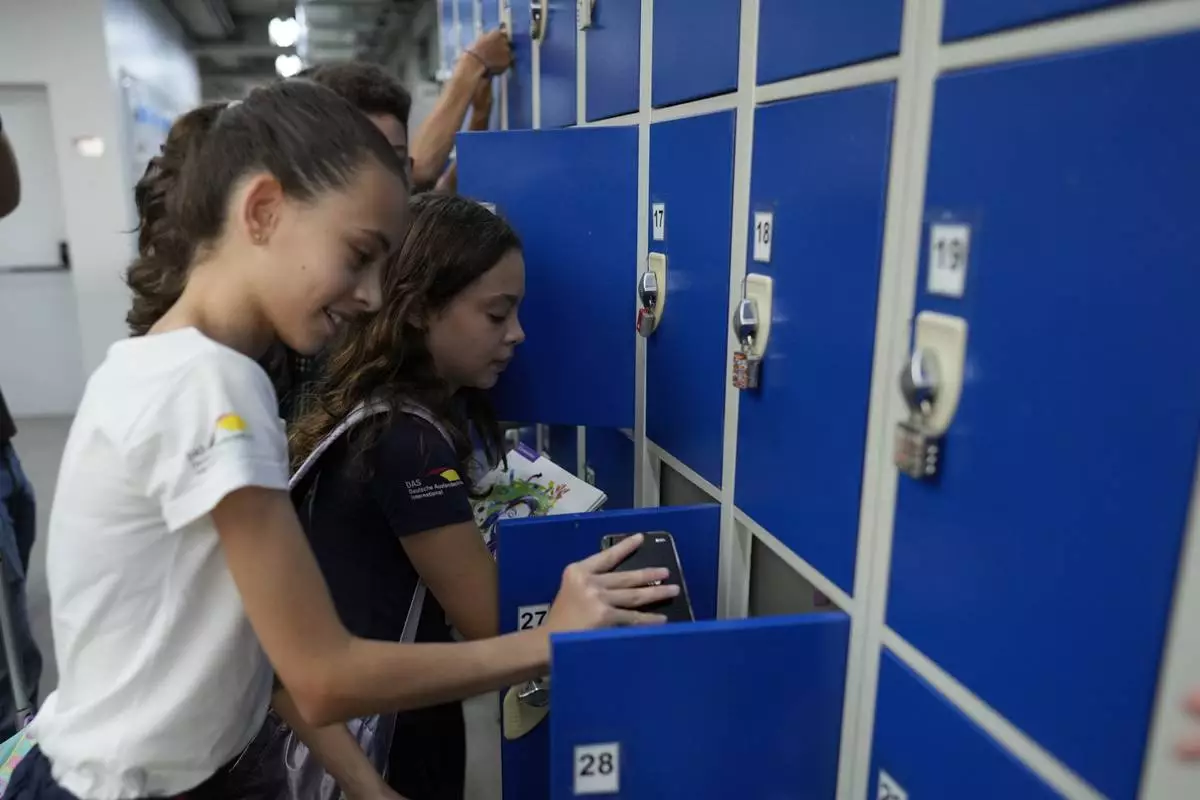
Students store their mobile phones in lockers at Porto Seguro School in Sao Paulo, Thursday, Feb. 6, 2025, as they head to class under a new law that forbids their use in schools. (AP Photo/Andre Penner)
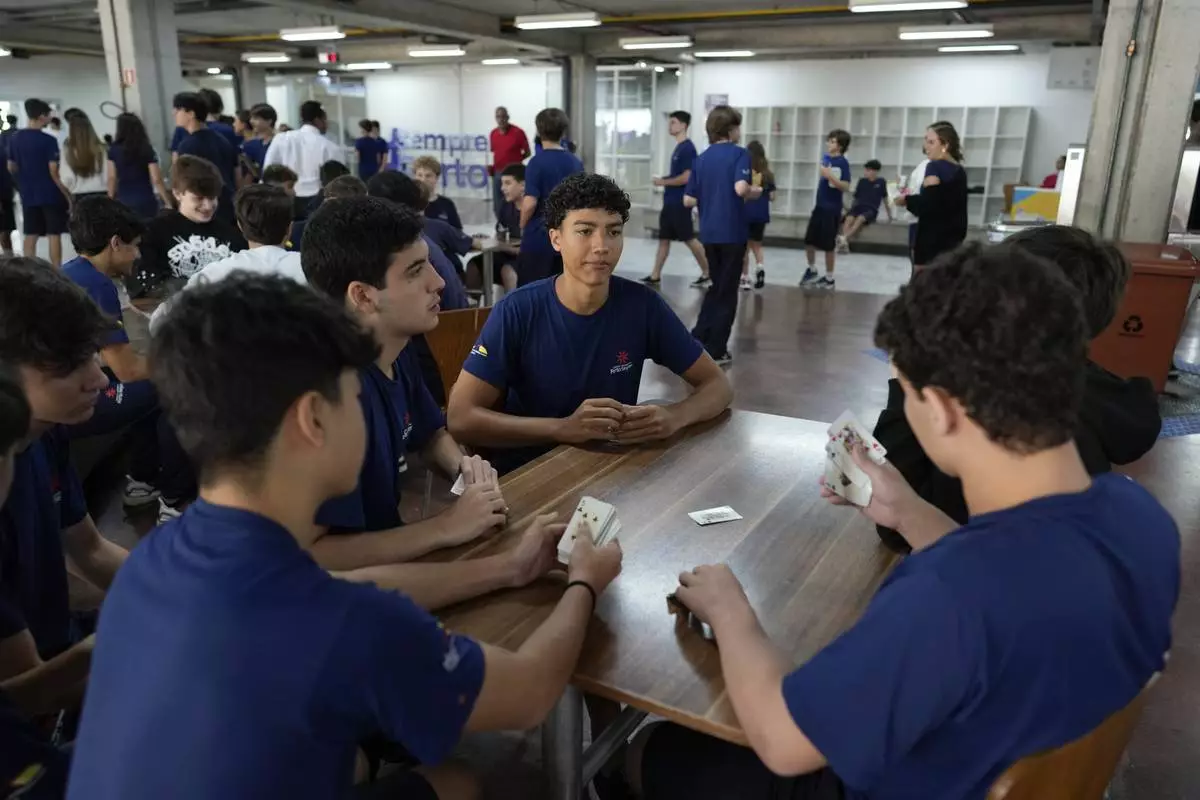
Students play cards during recess in their first week at school under a new law that forbids the use of mobile phones on campus, at Porto Seguro School in Sao Paulo, Thursday, Feb. 6, 2025. (AP Photo/Andre Penner)
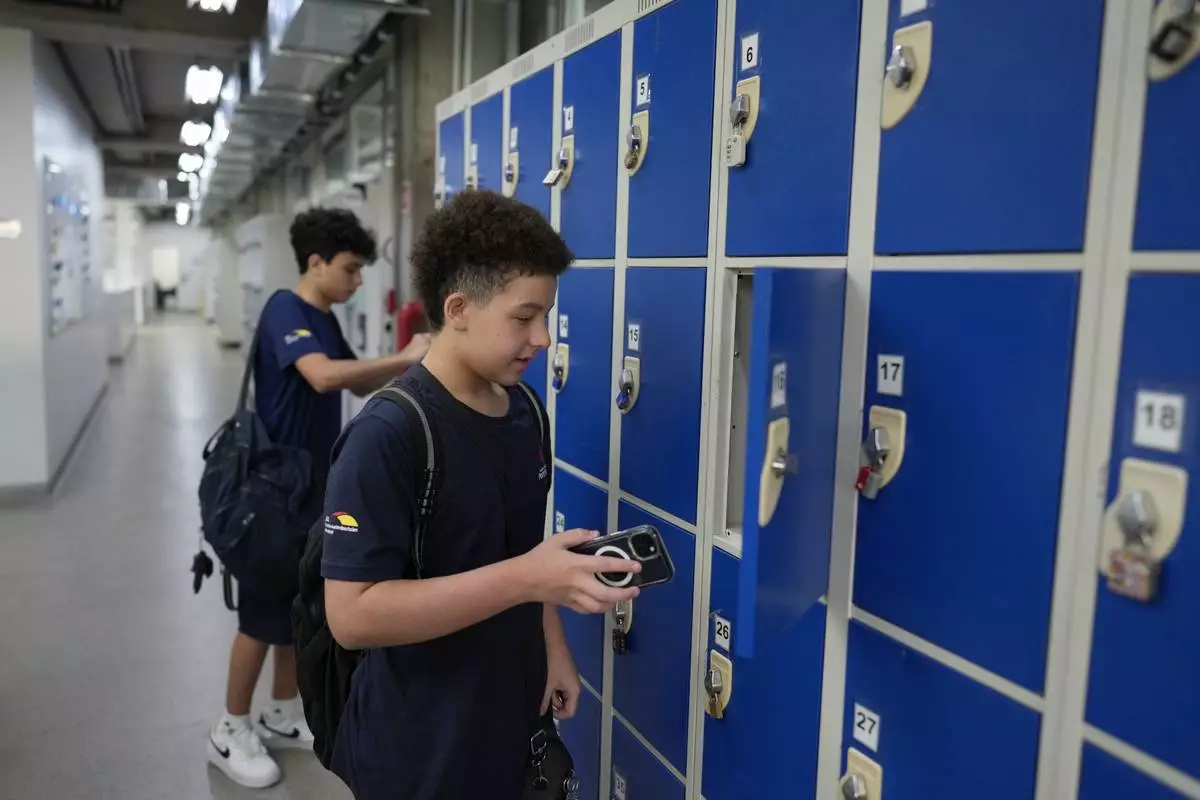
Students store their mobile phones in lockers as they head to class under a new law restricting their use on campus at Porto Seguro School in Sao Paulo, Thursday, Feb. 6, 2025.. (AP Photo/Andre Penner)
President Donald Trump was in Saudi Arabia on Tuesday, the first leg of his three-nation visit to the Middle East this week meant to tackle multiple crises and conflicts across the region.
He was welcomed by Saudi Arabia’s de facto ruler, Crown Prince Mohammed bin Salman, after Air Force One landed in Riyadh. Trump and the crown prince are to hold talks on U.S. efforts to dismantle Iran’s nuclear program, end the war in Gaza, hold down oil prices and more.
Trump is also expected to be feted by the crown prince with a formal dinner and a gathering of members of the Gulf Cooperation Council — made up of Bahrain, Kuwait, Oman, Qatar, Saudi Arabia and the United Arab Emirates — later on Tuesday.
Meanwhile, Trump’s special envoy for the Mideast Steve Witkoff has been involved in efforts to free the hostages still held in Gaza.
Here's the Latest:
Saudi Arabia and fellow OPEC+ nations have already helped their cause with Trump by stepping up oil production. Trump sees cheap energy as key to lowering costs and stemming inflation for Americans, and to hastening an end to the Russia-Ukraine war.
But Saudi Arabia’s economy remains heavily dependent on oil, and the kingdom needs a fiscal break-even oil price of $96 to $98 a barrel to balance its budget. How long OPEC+ will keep production elevated — Brent crude closed Monday at $64.77 a barrel — is questionable.
“One of the challenges for the Gulf states of lower oil prices is it doesn’t necessarily imperil economic diversification programs, but it certainly makes them harder,” said Jon Alterman, a senior Middle East analyst at the Center for Strategic and International Studies.
Trump offered the assessment as he and Saudi Arabia’s de facto leader held talks at the Royal Court in Riyadh.
He called Mohammed bin Salman a friend and said they’d developed a good relationship. He spoke about visiting Saudi Arabia in 2017 on the first foreign trip of his first term in office.
Trump has said he decided to make Saudi Arabia his first official overseas stop again because of the kingdom’s promise to invest $600 billion in the United States — and then he joked that the Saudis could bump it up to $1 trillion.
“I really believe we like each other a lot,” Trump said.
Witkoff and the Trump administration’s envoy for hostage affairs have told the families of hostages still held in Gaza that they will do what is needed to bring everyone home.
The two officials are next traveling to Qatar to join Trump there. Qatar has been a key mediator during the 19-month Israel-Hamas war.
Steve Witkoff, the U.S. special envoy, said they wouldn’t be traveling to Qatar if they didn’t think there was a genuine chance for progress in negotiations.
Edan Alexander has spoken with Israeli Prime Minister Benjamin Netanyahu.
“It’s crazy. It’s unbelievable,” Alexander said about his freedom in remarks released by Netanyahu’s office.
Asked how he feels, Alexander answered: “Ok, weak, but slowly we’ll get back to what we were before.”
Trump’s special envoy Steve Witkoff then got on the call and Netanyahu expressed his gratitude to the U.S. president for helping to free Alexander.
Witkoff also said, in a post on X, that Trump spoke with Alexander, and remains committed to bringing home all of the hostages.
There were reports Alexander was going to meet Trump in Qatar this week but a statement from the hostage forum, which represents the families, said he won’t be flying there. The family is in continuous contact with the Trump administration, it said.
The Israeli prime minister says that any ceasefire deal with Hamas would be temporary.
Netanyahu’s statement came ahead of Trump’s visit to the Middle East, which did not include a stop in Israel.
Netanyahu said that if Hamas were to say it would release more hostages, “we’ll take them, and then we’ll go in. But there will be no way we will stop the war.”
Israel says 58 hostages remain in captivity, with about 23 of them said to be alive.
For Saudi Crown Prince Mohammed bin Salman, Tuesday’s visit by President Donald Trump caps what’s been a series of major events to bring the kingdom back into the embrace of international business.
Businessmen thronged to a Saudi investment forum, a stark contrast to what happened after the 2018 killing of Washington Post columnist Jamal Khashoggi, who was slain by a Saudi hit squad at the kingdom’s consulate in Istanbul.
Meanwhile, the Saudi-led war in Yemen, which saw civilian casualties in their airstrikes, has faded into the background as the kingdom has sought a peace deal there and a detente with Iran, their regional rival.
Instead, the world’s media has crowded into the kingdom and broadcast images of the crown prince, smiling, greeting Sam Altman of OpenAI and Elon Musk. Meanwhile, the kingdom will host the FIFA 2034 World Cup, which will draw more attention here.
Trump called Mohammed bin Salman a friend and said they’d developed a good relationship. He spoke about visiting Saudi Arabia in 2017 on the first foreign trip of his first term in office.
Trump has said he decided to make Saudi Arabia his first official overseas stop again because of the kingdom’s promise to invest $600 billion in the United States. He joked Tuesday that they could bump it up to $1 trillion.
“I really believe we like each other a lot,” Trump said.
The U.S. special Mideast envoy Steve Witkoff met privately with families of the hostages in Tel Aviv’s Hostage’s Square on Tuesday.
Witkoff said he met with Edan Alexander, the Israeli-American soldier released on Monday, and that he was an “incredibly resilient young man.”
Hamas released Alexander who had been held hostage in Gaza for more than 19 months, offering a goodwill gesture toward Trump that could lay the groundwork for a new ceasefire.
Witkoff said negotiations for a more lasting ceasefire have begun, and that he hopes more hostages could be released soon. “We’re working on it,” he said.
Dozens of people stood in the Square and chanted “Bring them home now!”
Witkoff also spoke with and embraced Ruby Chen, whose Israeli-American son, Itay Chen, was abducted to Gaza and later pronounced dead. His body is still held in Gaza.
Trump had intended to use his four-day trip to press wealthy Gulf Arab nations to pour billions in new investment into the U.S. But now he finds himself navigating a series of geopolitical crises — and searching for glimmers of hope in the deep well of global turmoil — that are casting greater import on the first extended overseas trip of his second term.
“This world is a lot safer today than it was a week ago,” Trump crowed to reporters on Monday as he sized up the foreign policy challenges he’s facing. “And a lot safer than it was six months ago.”
The president was brimming with an overabundance of confidence about some of the world’s most intractable problems, from tensions in South Asia to the future of sanctions in Syria to the war in Ukraine.
But behind closed doors, the Saudi crown prince, Qatar's Emir Sheikh Tamim al-Thani, and Emirati President Mohammed bin Zayed will be looking to get a bead on how Trump intends to push ahead on resolving the war in Gaza, dealing with Iran’s rapidly progressing nuclear program and addressing India-Pakistan tensions.
▶ Read more about the geopolitical crises Trump is facing with his first trip
Hassan Eslaiah, who was targeted in an earlier strike, has been described by Israel as a Hamas militant posing as a journalist. Israel says he took part in the Oct. 7, 2023, attack that ignited the war. He and another individual were killed in the overnight strike, according to Nasser Hospital. Eslaiah was at the facility receiving treatment from severe burns from the earlier strike, Dr. Ahmed Alfarra said.
Israel said it struck militants who were operating inside the hospital, without identifying them.
An Israeli strike just outside the hospital in April set a media tent ablaze and killed two people, including a local reporter. Eslaiah was among six other journalists who were wounded in that strike. The Israeli military said Eslaiah was the target.
Eslaiah had occasionally contributed images to The Associated Press and other international media outlets as a freelance journalist, including on Oct. 7. The AP has not worked with him for over a year.
Khalid al-Falih spoke at a Saudi-U.S. Investment Forum ahead of Trump’s arrival in Riyadh.
“Our bilateral relationship is one of the world’s most significant geostrategic bonds, with economic cooperation and business partnerships at its core, and serves as a force for peace and global prosperity,” he said.
He reiterated a pledge by the Saudi crown prince to see investment in the U.S. of $600 billion over the next four years.
Saudi crown prince’s airport greeting for Trump underscores the close relationship the de facto ruler of the kingdom wants to have with the American leader.
Typically, a provincial governor or another official will greet a foreign leader on arrival. King Salman once greeted President Barack Obama at the airport on a trip to the kingdom, but then lower-ranking officials did as the kingdom grew angry over his stance on the 2011 Arab Spring and the 2015 nuclear deal with world powers.
President Joe Biden also was greeted by a provincial governor on his 2022 trip to the kingdom, before having an awkward fist-bump with Prince Mohammed, who he derided as a “pariah” during his election campaign after the killing of Washington Post columnist Jamal Khashoggi.
U.S. Treasury Secretary Scott Bessent said on Tuesday that America and China now have a “mechanism” to avoid tensions.
He spoke at an investment forum just before Trump was to land in Saudi Arabia.
“We had a plan, we had a process. What we did not have with the Chinese was a mechanism,” Bessent told the forum. “After this weekend, we have a mechanism to avoid escalation like we had before.”
Bessent said America could have a “big, beautiful rebalancing” with China as Beijing aims to have more of a consumption-based economy and Trump wants to see more precision manufacturing done in the U.S.
Previous trips by U.S. presidents to the kingdom have drawn comments about Saudi Arabia being “milked” by the Americans for oil and dollars for military sales.
But this time, Iranian newspapers and state television largely are not discussing Trump’s trip in detail.
The quiet may be due to the fact Riyadh and Tehran have been in a Chinese-mediated detente since 2023. Saudi Defense Minister Prince Khalid bin Salman, a brother to the Saudi crown prince, also traveled to Tehran in a high-level visit unthinkable in recent years of tensions between the two Mideast rivals.
Hussein Ibish, an analyst at the Washington-based Arab Gulf States Institute, said Saudi Arabia’s economic development projects at home means the kingdom wants peace across the region.
American and Saudi flags lined the streets in Saudi Arabia’s capital ahead of Trump's arrival, along with a noticeable security presence in Riyadh of all American-made police cars.
At a “Media Oasis” set up for journalists, giant video screens showed off Saudi construction projects like its futuristic NEOM city and its hosting of the 2034 FIFA World Cup. A mobile McDonald’s sat in the parking lot, still shuttered.
Prince Turki al-Faisal, who led Saudi intelligence for more than two decades and served as ambassador to the U.S. and Britain, wrote in the English-language Arab News newspaper to Trump that “our doors and hearts are open to you.”
Saudi Arabia’s tightly controlled media offered positive comments regarding Trump’s visit. Columnists in the kingdom sought to describe the visit as part of a strategic reset in American-Saudi relations, which date back to when then-President Franklin Roosevelt met King Saud aboard the USS Quincy in 1945.
“Many countries around the world, including in Europe, are following Saudi Arabia’s lead in managing their affairs with Trump,” wrote Abdulrahman al-Rashed in Asharq Al-Awsat. “The era of relying solely on political and military alliances with Washington is over; the focus now is on forging shared interests.”
Faisal J. Abbas of the English-language Arab News wrote that “the significance of the visit cannot be overstated — nor could its timing be more crucia,” given Saudi Arabia’s mediation in the Russia-Ukraine war and the recent conflict between India and Pakistan.
He also acknowledged business deals would be part of the trip as well.
“Putting America first does not mean ignoring opportunities abroad; it means seizing them,” Abbas added.
Trump’s trip to Saudi Arabia comes as the president can already point to one thing for American voters — oil prices are down.
It’s not Trump’s doing, though he’s repeatedly criticized Saudi Arabia and the OPEC+ oil cartel over higher oil prices in the past. Those prices translate directly back into gasoline prices in the United States, which can become a major pain point for the U.S. public. The average price for a gallon of gasoline in the U.S. is $3.13, according to AAA, down from $3.61 a year ago.
Right now, benchmark Brent crude trades around $64 a barrel. That’s higher than when the around $50 a barrel it traded on his first trip to the kingdom as president in 2017. However, it’s nowhere near the spikes seen after Russia’s full-scale invasion of Ukraine in 2022. Then, the average gallon of gas in the U.S. was $5.01 at its height.
Economic uncertainty over Trump’s tariff policy has depressed global energy prices — as has OPEC more rapidly opening up production than initially thought. Saudi Arabia in particular needs that extra revenue as the crow prince's expansive development plans and the kingdom hosting the upcoming 2034 FIFA World Cup will need hundreds of billions of dollars of investments.
The Syrian Foreign Ministry says the sanctions on the country were imposed under the government of ousted Syrian President Bashar Assad and helped in removing him from power.
But they are now harming the Syrian people, the ministry says, describing Trump’s comments about removing them as “an encouraging step” to end the suffering of Syrians.
The ministry said in a statement late Monday that the sanctions are hindering reconstruction in the war torn country.
The Syrian people are looking for the “full lifting of the sanctions” as a step that boosts peace and prosperity both in Syria and the region, and open the way for international cooperation, it said.
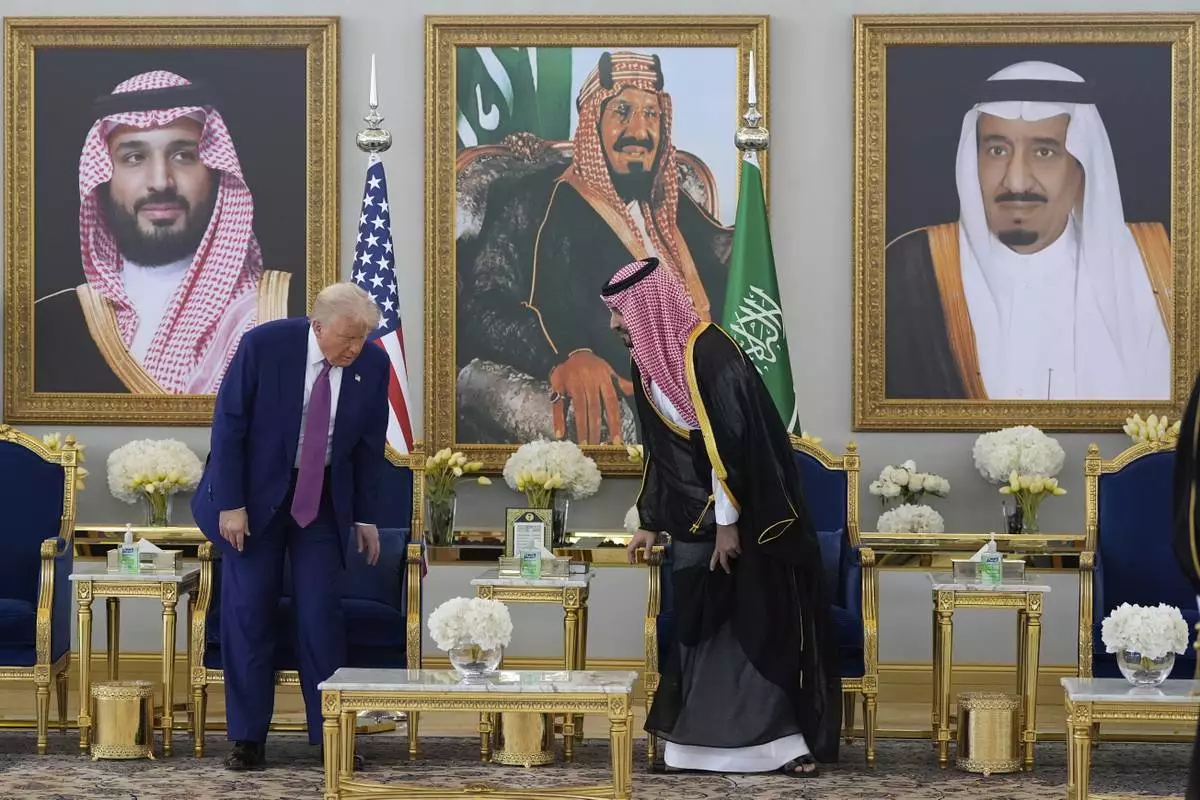
President Donald Trump arrives with Saudi Crown Prince Mohammed bin Salman for a coffee ceremony at the Royal Terminal of King Khalid International Airport in Riyadh, Saudi Arabia, Tuesday, May 13, 2025. (AP Photo/Alex Brandon)
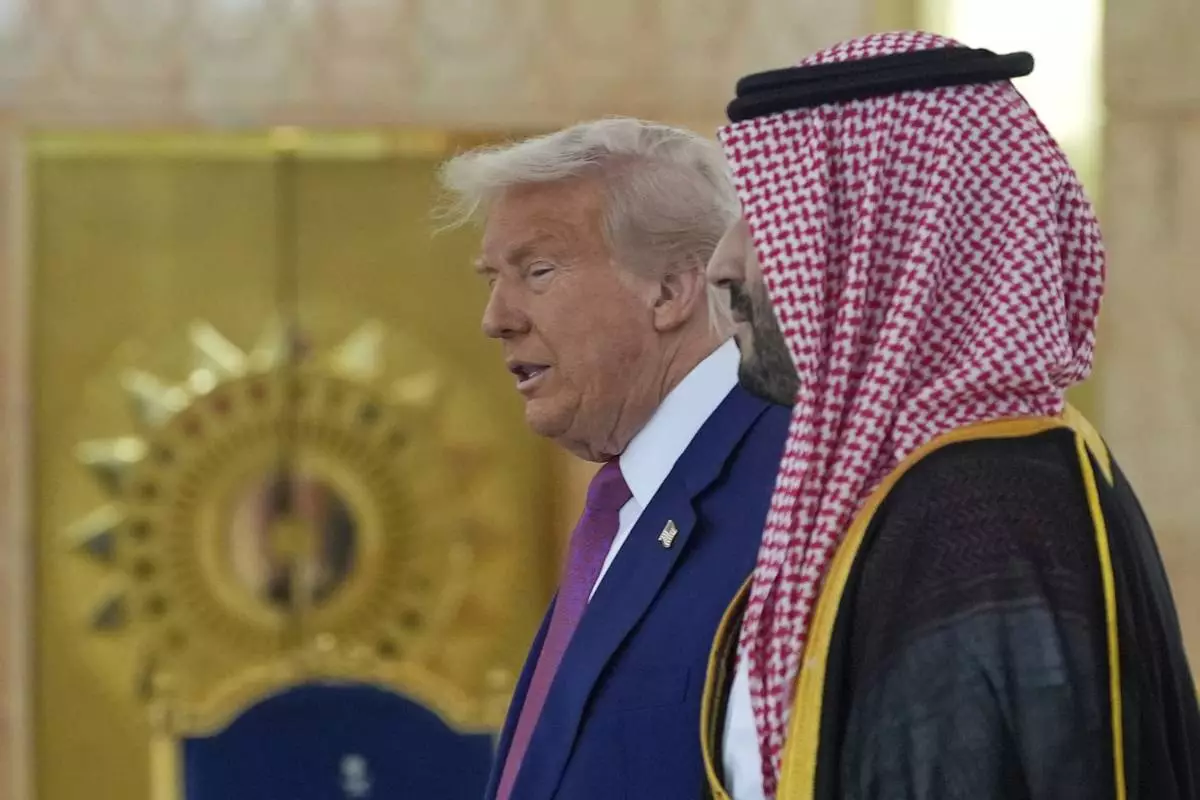
President Donald Trump arrives with Saudi Crown Prince Mohammed bin Salman for a coffee ceremony at the Royal Terminal of King Khalid International Airport in Riyadh, Saudi Arabia, Tuesday, May 13, 2025
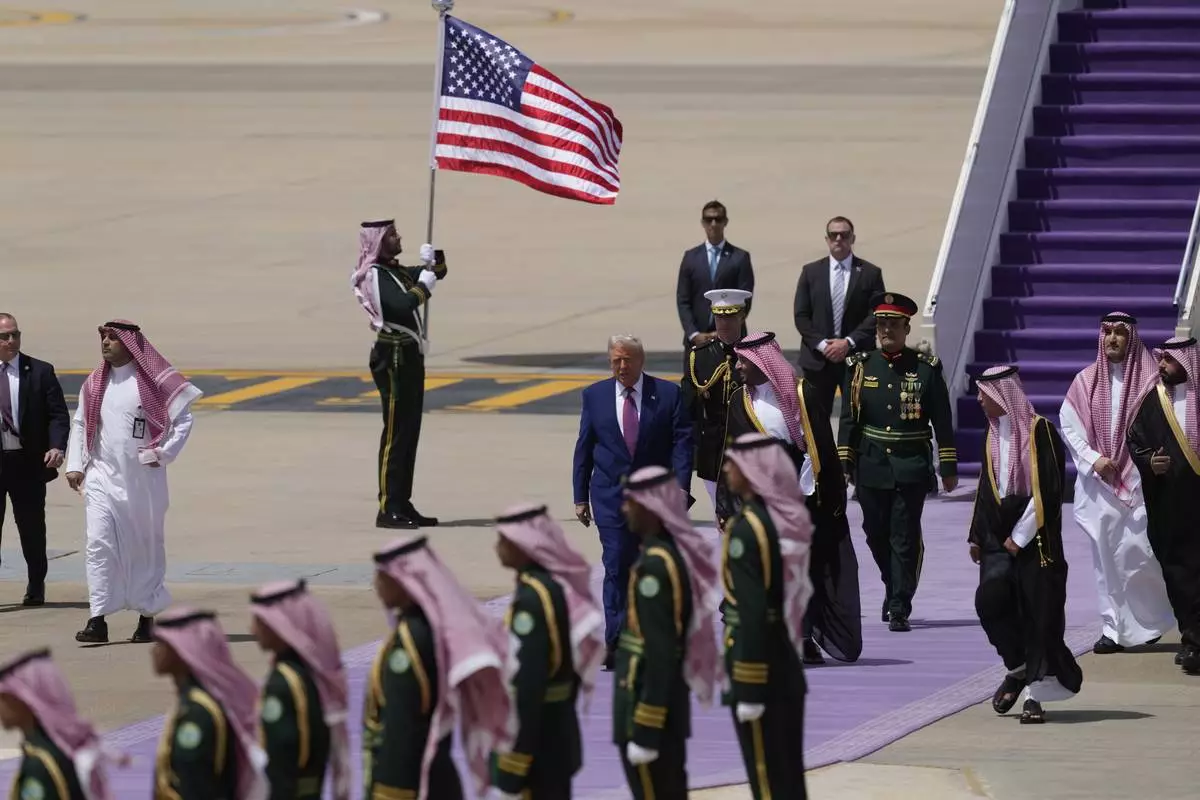
President Donald Trump speaks with Saudi Crown Prince Mohammed bin Salman during an arrival ceremony at the Royal Terminal of King Khalid International Airport in Riyadh, Saudi Arabia, Tuesday, May 13, 2025. (AP Photo/Alex Brandon)
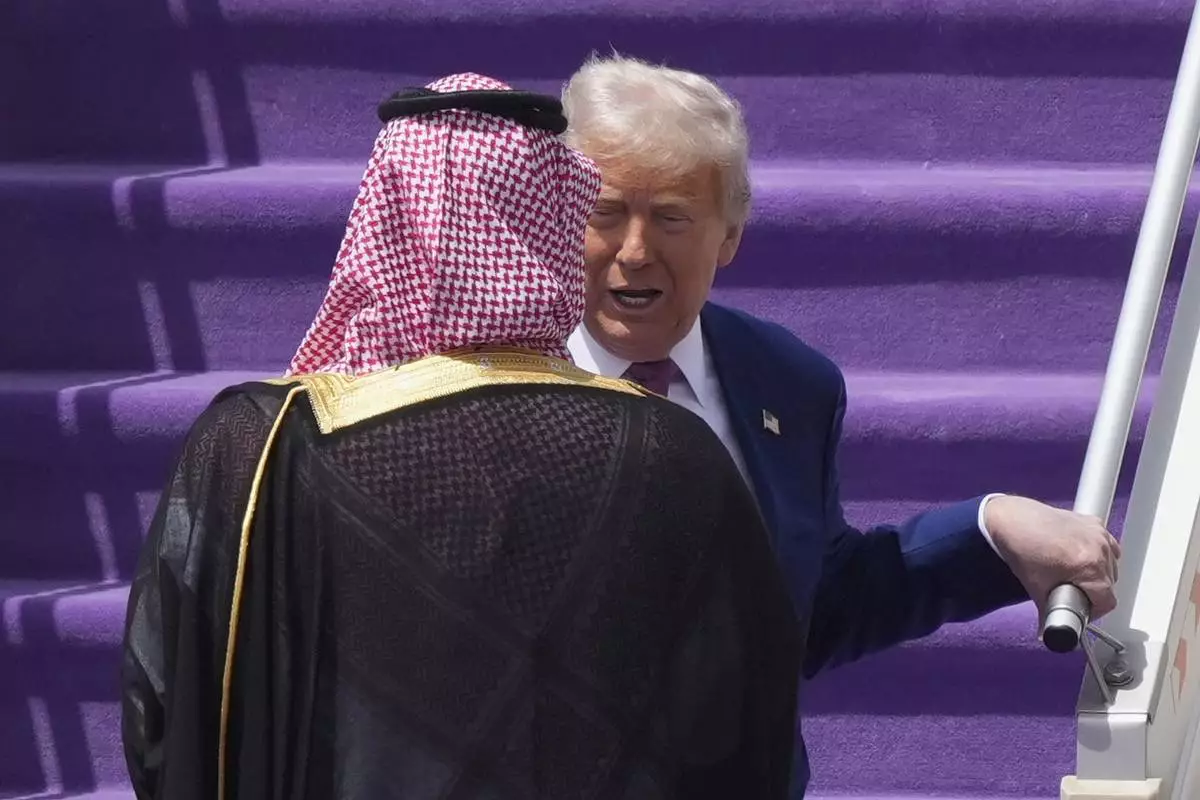
President Donald Trump speaks with Saudi Crown Prince Mohammed bin Salman during an arrival ceremony at the Royal Terminal of King Khalid International Airport in Riyadh, Saudi Arabia, Tuesday, May 13, 2025. (AP Photo/Alex Brandon)
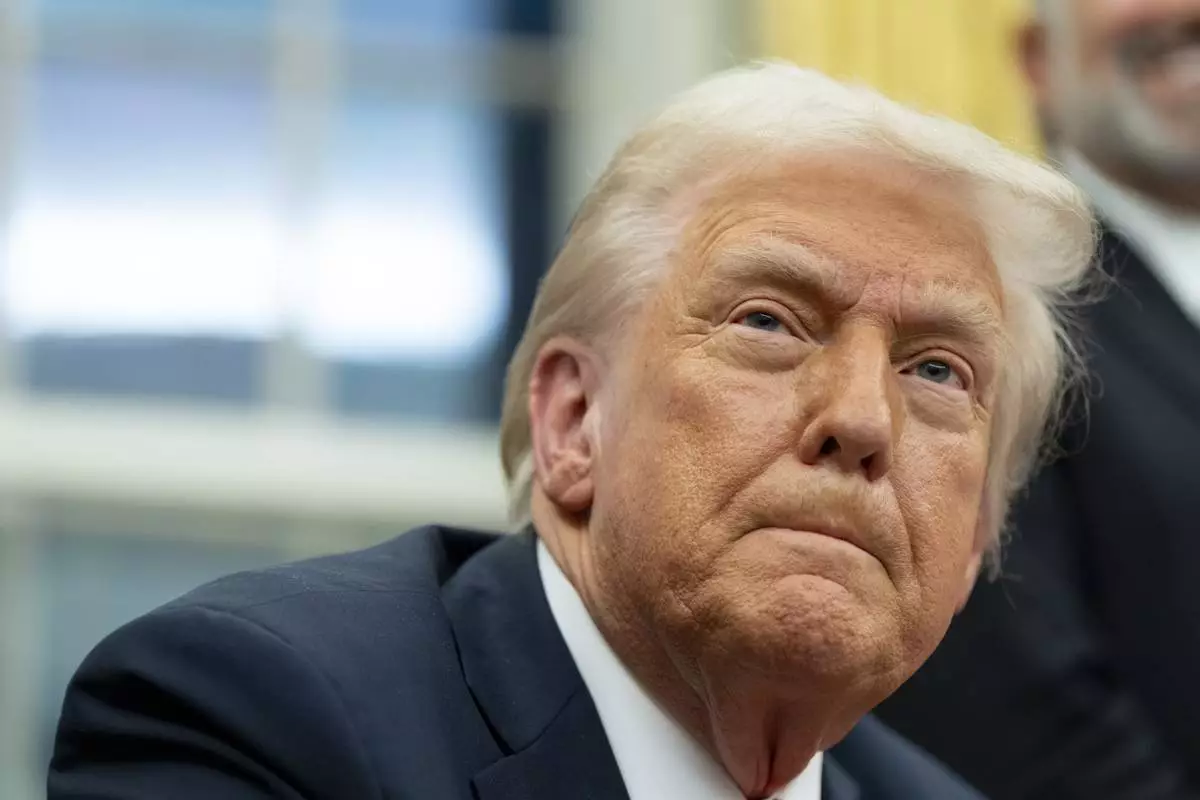
FILE - President Donald Trump speaks with reporters as he signs executive orders in the Oval Office at the White House, Feb. 10, 2025, in Washington. (AP Photo/Alex Brandon, file)









